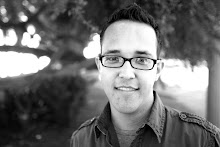As you may have guessed, I'm still trying to figure out what this whole latency of God thing means. I continue to struggle with how to be an agnostic Christian (see my brief and flawed explanation here) and a faithful one at the same time. What does it mean to be uncertain about God but still believe in God? How does all of this crazy stuff work?
One of the things that troubles me the most is the inevitability of being a "relativist." Now, I have to admit that the main reason I'm afraid of being a relativist is because of my up-bringing--as a kid it was made very clear to me that relativism meant wishy-washy meant sinner meant hell-bound. So, as I reckon with the idea of God existing as potential, I'm forced to deal with my own relativism as well.
It recently occurred to me, however, that I am actually no more relativistic than my high school math teacher. Mrs. Salvidge was a brilliant older woman with a well-kempt puff of white hair on her head, who had the remarkable ability to be both tediously meticulous and engaging at the same time.
One thing that I hated, though, was the day she explained probability to us. Of course we all knew that the chance of rolling a two was 1 in 6, and we had all done plenty of boring word-problems that involved drawing colored marbles from a hat. But none of us knew what probability really meant until that day.
The way she explained probability was with a deck of cards. Holding up the cards, she asked us what the top card was. Students shouted out various guesses: "Six of spades!" "Queen of diamonds!" "Ace of clubs!" But the correct answer was: "It is any and all of them. It is two, seven, and jack of hearts all at the same time. It is each and every possibility--until you turn it over."
And that pissed me off. I knew that there is only one reality. Physically, the top card is a four of spades regardless of whether I have seen it yet. The values and suits aren't mystically changing around until just before I reach to flip over the card. There is only one truth--it is a four of spades.
However, since high school I have come to accept probability as a useful concept. It is how gamblers, real estate agents and venture capitalists make their money (I know there is more to it than luck, but calculated risk is really just a probability). But more than being a means for getting rich, probability is a useful term because of how descriptive it is. What is surprising, though, is that it doesn't actually describe dice or cards or colored marbles--it describes us as humans.
The truth behind any given situation is that we don't know what is going to happen. We can make guesses. We can estimate. We can take calculated risks. But we really don't know what is actually going to happen. What probability really describes is our perpetual lack of knowledge. Even if we've been counting cards, we can never be absolutely certain what the next card will be. The reason we talk about probability is that we don't know what the outcome is going to be--if we knew exactly what was going to happen when we roll the die, then there would be no 1 in 6.
As it turns out, latency is little more than probability--it is a term that describes us and what we don't know. In reality there either is or is not a God in the same way that the top card either is or is not the ace of spades. In both cases there is a reality that we just plain don't know for sure. Probability and latency both describe our uncertainty about that reality.
Don't misunderstand me--I'm not trying to calculate the chances of God's existence. I guess that what I'm really saying is that the strange concept of latency may not really be that strange after all. Yes, it is a term that describes an uncomfortable unknown, but it is surprisingly similar to something we've all dealt with in math class.
There is no way we can be absolutely certain about God's existence, so the best we can do is begin with latency. In our experience, God exists as potential. The truth about God is out there, but it is something we cannot know for sure. . . .
So, does God exist? It is probable.
Thursday, April 3, 2008
Subscribe to:
Post Comments (Atom)


No comments:
Post a Comment
Let me know what you think....